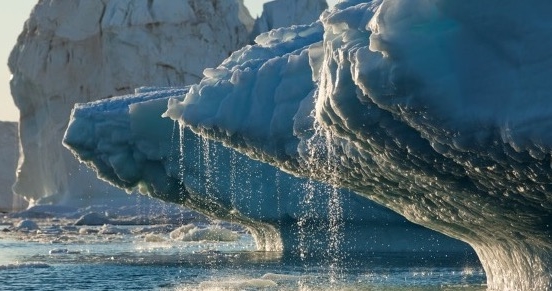Climate, Health and Equity Brief
Melting ice, Arctic rain and toxic waterways
December 6, 2021

The Climate, Health & Equity Brief is GMMB’s take on the week’s news on the current impacts of climate change. If you haven’t subscribed yet, you can do so by clicking here.
Hot Topic: Melting. Melting ice has historically been disregarded as an irrelevant, far-away problem, but new research shows that impacts are getting closer and closer to home.
This year, Greenland lost a whopping 500 gigatons of ice to calving—the breaking away of an ice mass from a glacier, iceberg or ice shelf—and sea ice melt. That’s the highest annual loss in 35 years of satellite records, and it accounts for almost a tenth of the total amount of ice lost since 1968—in just one year.
Greenland’s summit also experienced rainfall this year for the first time in history, and scientists predict this will become increasingly common. A major study from the journal Nature revealed that as soon as 2060, parts of the Arctic could be dominated by rain instead of snow unless we take aggressive action now to cut emissions and slow the rate of Earth’s warming. The effects of ice melt and rain in the Artic are also predicted to have a cascade effect, accelerating sea-level rise and threatening critical infrastructure and hundreds of millions of people in coastal communities around the world.
And the shift from snow to rain isn’t isolated to the Arctic. This year marks the first time in history that Denver has started the month of December with no snowfall. And scientists predict that snow in California’s Sierra Nevada range—which provides up to 30 percent of the state’s water supply—could disappear in just 25 years.
In one example of the potential impact of rising seas, officials in California have identified at least 400 toxic waste sites along the state’s coast that are at risk of inundation. This would not only destroy homes, communities and critical infrastructure, but also expose residents of the predominantly working-class and Black and brown communities that surround the sites to a deadly flow of industrial carcinogens that would pollute crucial water sources and pose an imminent threat to human health.
— Matt & Traci, GMMB
Planetary Health
New research projects that by as early as 2060, parts of the Arctic could experience more rain than snow, causing sea levels to rapidly rise and leading to melting permafrost that would release massive amounts of methane and carbon dioxide. (The Washington Post)
Greenland’s ice loss from iceberg calving and sea ice melt has reached the highest recorded levels since satellite records began in 1986, with around 5,500 gigatons of ice lost between 1968 and 2021. (The Washington Post)
A new study predicts snow in California’s Sierra Nevada range could disappear in just 25 years, leaving the area without crucial melt-off in spring and summer that fills rivers, nourishes plants and animals and provides up to 30 percent of the state’s water supply. (San Francisco Chronicle)
The 2021 hurricane season has come to a close, ending the year with the third most storms in a single season on record, the fourth costliest hurricane season in history, and the sixth straight year with more storms than average. (The Washington Post)
Human Health
A new study showed that pregnant women exposed to high temperatures or air pollution were more likely to have premature, underweight or stillborn children, and another revealed that premature births fell at least 20 percent in an area of California where fossil fuel plants were shuttered. (The New York Times)
The American West has faced record-breaking wildfire seasons in recent years, leaving a heavy toll on firefighters who suffered from depression, anxiety, and increased risk of suicide. (Reuters)
Eco-grief is a growing mental health phenomenon as climate change drastically transforms landscapes and brings distress and deep sadness to people worldwide, with Indigenous cultures bearing a particularly heavy burden. (Atmos)
Glaciers melting is our sign that Earth is crying.”
-Unknown
Equity
A new academic project warns that sea level rise in California could inundate more than 400 hazardous facilities in the state—which Black and brown communities are five times more likely to live within a half-mile of, compared to the general population—exposing large communities to dangerous pollutants. (Los Angeles Times)
Politics & Economy
The first ever National Intelligence Estimate on Climate Change report identified 11 countries—currently home to more than 1.8 billion people—that are particularly vulnerable to climate-fueled geopolitical instability due to increasingly diminished energy, food and water security. (CNBC)
The far-right’s history of climate denialism appears to be waning, but in its place is a new form of environmental populism that leads to “ecobordering,” where stricter anti-immigration practices are touted as critical to protecting the U.S. and European countries against environmental destruction. (The Guardian)
The Smithsonian Institution—the largest museum complex in the world and home to more than 150 million artifacts—is already facing the effects of climate change, including flooding from increasingly heavy rainstorms and the rising waters of the Potomac River. (The New York Times)
Action
The world’s first passenger flight powered fully by sustainable aviation fuel flew Wednesday from Chicago to Washington, D.C. for United Airlines. (Axios)
The White House announced a new energy division within the presidential Office of Science and Technology Policy which will be responsible for contributing to climate change policy and ensuring an equitable energy transition. (The Washington Post)
The largest producer of cement in South Africa announced its goal to reach net-zero emissions by 2050, a major move in an industry that currently accounts for 32 percent of manufacturing emissions in Africa. (Bloomberg)
Kicker
Looking for some eco-friendly gifts for the holidays? Check out this list.
The GMMB Climate, Health & Equity Brief would not be possible without the contributions of the larger GMMB California team—Aaron Benavides, Elke Cortes and Stefana Simonetto. Feedback on the Brief is welcome and encouraged and should be sent to CHandEBrief@gmmb.com.






